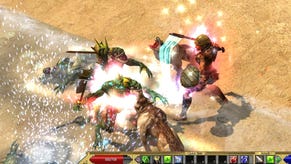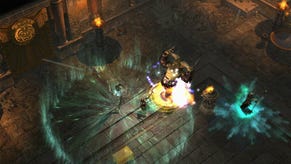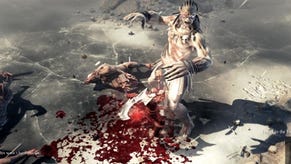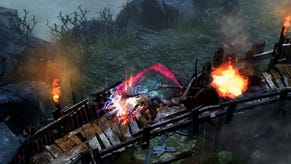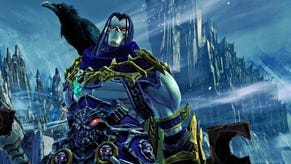I Seem To Be Having Trouble Starting Titan Quest
The Idyll Riddle
Titan Quest is a game I've gone back to a few times over the eight or so years since it came out. A straight, classic(al) Action RPG, I find it hard to fully justify why its calm ways engross me so much. Yet every so often it calls to me, so back once again I went. And found I couldn't start. Not because of technology issues - it holds up extremely well - but because of that opening moment: it felt too good.
I'm stood in the opening area, my character bobbing her idle animations, and I don't want to go anywhere.
Titan Quest is such a warmly remembered game, always mentioned when people celebrate the action role-playing game, sitting neatly between Diablo and Torchlight. And yet it always feels to me like an underdog – a modest game, underplaying the dramatics, getting on with being a really refined interpretation of the ARPG, without wanting to make a fuss. But that composed exterior belies the care and interest that went into its creation.
I remember visiting the now defunct developers, Iron Lore, during the development of the game, and its being one of the most interesting studios I'd visited. At the top was Age Of Empires creator Brian Sullivan, in his own office, and then the rest of the open-plan room was filled with desks belonging to an eclectic mix of old-school and fledgling game developers, as well as a surprising number Sullivan had plucked from Nintendo. And all seemed to be making Titan Quest for different reasons.
I most strongly remember Rich Sullivan (no relation of Brian), a former member of the Looking Glass team. He was a wonderfully cantankerous man, old far beyond his years, and an incredibly talented artist. At the time of my visit he was working on creature design. And while a diversion to working in animation for years had meant he'd adapted to using a tablet for much of his work, he had still defiantly built everything that was to be included in the game out of clay. And they were works of art. At my observing that his designs reminded me of Ray Harryhausen, he unleashed a wonderful rant about how none of these damned kids he was working with had heard of Harryhausen, and how he'd been forcing them to watch his movies during their lunch breaks.
Brian Sullivan was a very different person to talk to about the game. While he was certainly very enthusiastic about the project, it was very much as a businessman, rather than the game designer I had been expecting to meet. He said, as I interviewed him for PC Gamer, how he expected Titan Quest to be a break-out success, to be a game that reached a non-gaming mainstream audience – that it would do for the RPG what The Sims had done for management games. And I didn't really know what to say, because, well, no it wouldn't. It was a game about hitting mythical creatures with an axe. It was slightly awkward.
Of course it wasn't a break-out success. Iron Lore, after releasing the expansion pack of Immortal Throne, could not secure funding for any further projects, and came to an end. Which is rather sad. But the game they left us with genuinely captures all the different attitudes that went into it – something accessible to a wider crowd than the more die-hard (geddit?) Diablo, but passionately detailed about the various mythologies it explored. It is, as the ARPG is wont to be, a game of minimalism in many ways – an awful lot of left-clicking, quite a lot of right-clicking, and a good few chats along the way. And it does this with grace. I think that's a word that I'd apply to Titan Quest, and not the many others in its field: grace.
So why am I waffling at such length, disappearing into anecdotes, and not just getting on with playing the game? Because I'm having an awful lot of trouble leaving the opening screen.
Once you've picked a sex and a tunic colour for your character, you're in. There's no initial customisation, beyond giving the lady or gentleman a name, no rolling stats or worrying about classes. You're a boy or a girl, and that's your lot. And you appear stood by a small thatched hut, a stall of various fruits and vegetables outside, next to a gently rippling lake. And it's beautiful. Certainly, the game has aged in almost ten years, but not nearly as much as you might expect. On the water lazily bobs a small, wooden boat (agonisingly unavailable to pootle about within), while around you chickens calmly scratch and peck at the grass. It's a scene of idyll.
A man stands to the right, and if you talk to him he impresses upon you with some urgency that there are dangers up the road. Please, he pleads, could you do something about it? But I don't want to. Because right here, by this shack by the lake, seems far too pleasant a thing to spoil with thoughts of satyrs. There are birds twittering, reflections gently undulating in the water, and I just want to sit down, tip my head up toward the sky, and just be.
There's something odd about this moment. This knowledge that my agency in this game is to introduce the death and suffering. If I stay still, it's serene. If I move, I'm off on a couple of dozen hours of (very entertaining) clicking on things until they're dead.
I've experienced this game-opening paralysis before, in much more severe ways. The utterly vile opening of Medal Of Honor: Warfighter was a far more crippling experience. There my opening move, the only available option, was to shoot a stranger in the back of his head. Gun held out in front, fixed in position, the game instructing that I had to left click to continue. Left click to blow this unaware stranger's brains out, for no stated reason, with no idea who he was or what he was doing. That was just grotesque. Titan Quest's is the opposite – it's too lovely.
And then I'm over it, and I'm off, and I'm clicking on things and trying the Dream Mastery specialism as I've never done it before, and saving stranded men, thwacking harpies out of the sky, and making the blank map turn filled in. Though still thinking about that hut by the lake.
Titan Quest is still available on Steam. A good few former Iron Lore members went on to form Crate Entertainment, building Grim Dawn.







